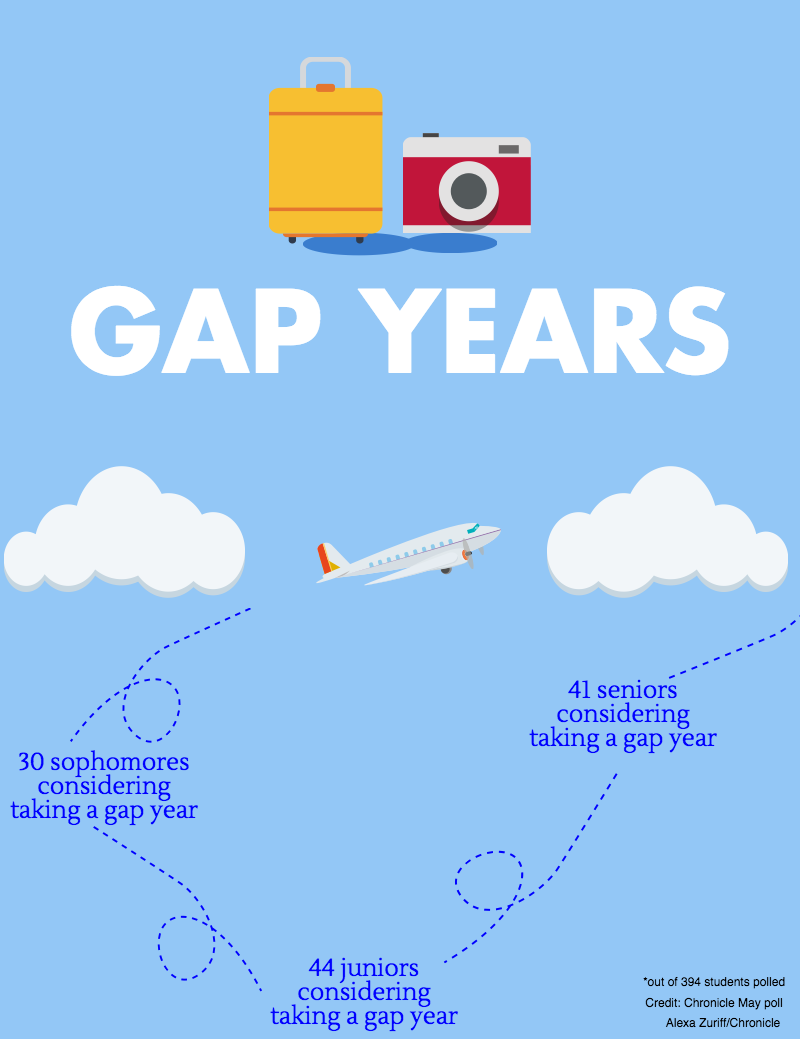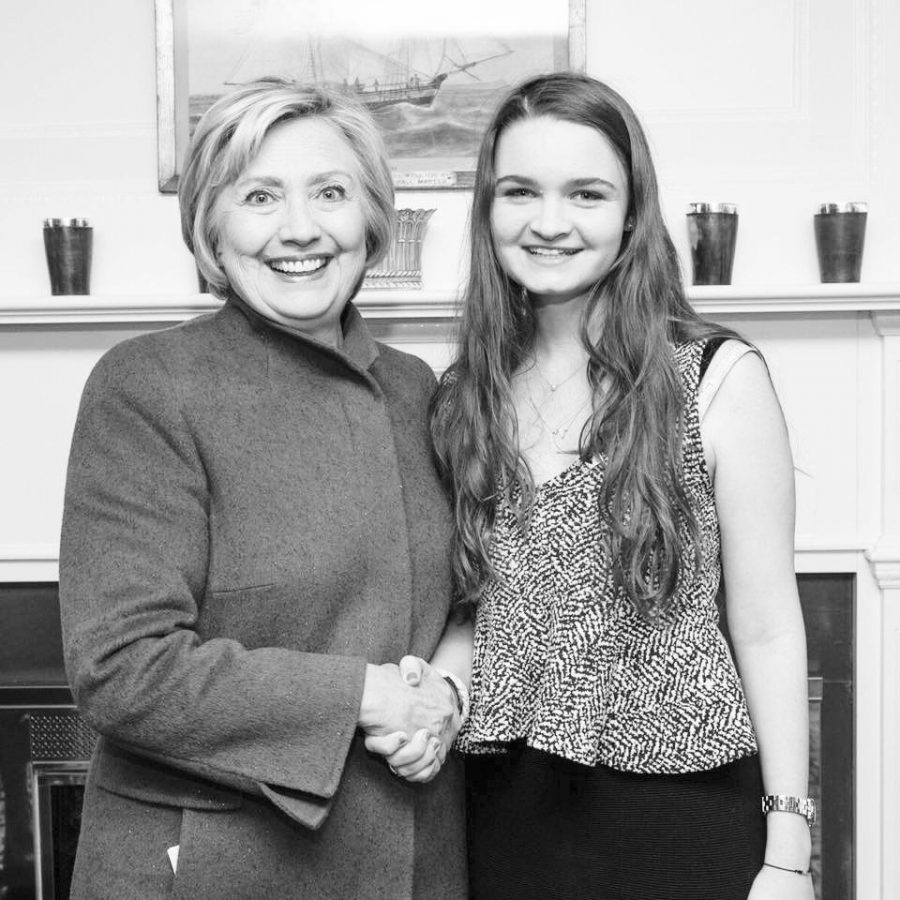Like a growing number of graduating high school seniors, including the president’s daughter Malia Obama, Conor Belfield ’14 took a year off before starting college in 2015.
“I felt like I was on a path that was leading me very quickly towards adulthood and everything that entails, which is both very exciting and nerve-wracking at the same time,” Belfield, who completed his freshman year at Bowdoin College, said. “I was looking to have an adventure and put everything else on pause.”
Like most students who take a gap year, Belfield tried to do things he thought he might not have the chance to do otherwise.
He spent three months living in South America through a program offered by educational organization Thinking Beyond Borders. Belfield divided his time between working at a school in Ecuador and a community center in Bolivia, with a week-long trip to Peru in between, where he climbed Machu Picchu.
“I’m aware that I had a minimal impact,” Belfield said. “But I think that just by meeting people who were doing their best to try to change the world, I am more likely to have a bigger and hopefully better impact in the future.”
Belfield also spent three months in India on a National Outdoor Leadership School program, where he went backpacking and whitewater rafting and lived with a host family. Living on his own in foreign countries was a life-changing experience, he said.
“It wasn’t like slightly coming out of my little world in Los Angeles,” Belfield said. “I was in a completely new world where I could define what relationship I wanted to have with the environment I was in.”
Harvard-Westlake assists a couple students each year by granting fellowships through the Michael Brownstein ’99 Memorial Gap Year Fellowship Program.
Initiated in 2008, the Brownstein Fellowship awards up to $10,000 to each selected senior to help cover expenses for an experience that can include foreign travel and service to others.
Belfield was a 2014 Brownstein Fellowship recipient.
“I was very lucky to be one of the Brownstein Fellows,” Belfield said. “There is no way I could have done the gap year without that stipend.”
Belfield credits his year off with improving his work freshman year.
“By the end of my gap year, I was so excited to go back to class and start learning again,” Belfield said. “In my first year in college, I’ve had a more vigorous interest in my studies.”
Colleges are seeing the same academic results Belfield reported.
The Harvard College Admissions page said that the school “encourages admitted students to defer enrollment for one year to travel, pursue a special project or activity, work or spend time in another meaningful way.”
While Harvard has supported gap years for approximately 40 years, other selective colleges, including Yale and Brown, are joining the trend. Some schools even offer programs that help students design and pay for their experiences.
With the support of colleges, the number of students taking gap years is increasing too.
Harvard reports that now nearly seven percent of incoming freshmen take a gap year.
“We have been big fans of the gap year for a very long time here at Harvard,” Harvard College Senior Admissions Officer Kaitlin Howrigan said. “In recent years our incoming classes have typically included between 90 and 115 students coming off a gap year experience out of 1,665 matriculating students.”
No official study tracks the number of U.S. students who take a year off before college. However, attendance at gap year fairs increased 300 percent between 2010 and 2014 according to The American Gap Association, a non-profit organization that researches the benefits of gap years.
In a May 20 Chronicle poll of 282 juniors and seniors, 30 percent said they were either planning to take a gap year, had considered or are currently considering taking one.
Former Head Prefect Sarah Winshel ’15 pursued politics during her gap year. Although she knew she wanted to take a year off before college, Winshel wasn’t sure what she would do during it. Once Hillary Clinton announced her candidacy for president, the choice was clear, Winshel said. She is spending a year living in New York, working as a volunteer for Clinton’s campaign.
“I’ve always been interested in politics, and I wanted to see whether the world that I saw and envisioned on ‘West Wing’ was really as wonderful and interesting as it seemed to be, and I can tell you that it is,” Winshel said.
She plans to attend Wellesley College in the fall.
“Although Harvard-Westlake really does a great job in teaching us discipline and work ethic, what I’ve learned [on the campaign] is different,” Winshel said. “There is an operation, and there are other people who are expecting you to be part of the team in your work. It makes you more invested in what you are doing rather than just thinking that you need to study and do well on the tests for yourself.”
While Winshel said she has loved her experience, she acknowledges it may not be right for everyone.
“Some people should go straight on to college and continue their education without a break,” Winshel said. “But I think that gap years need to be a greater part of the conversation, particularly for people who have an interest in something specific that they want to do or somewhere they want to go.”
Upper school dean Sharon Cuseo invited Winshel to speak with juniors this year. She wanted to offer students a new perspective to help them decide if an academic break was something they wanted to explore.
Cuseo confirmed that while Harvard-Westlake does not maintain records on the number of students who take time off before college, there has been a marked statistical increase since the school started offering the Brownstein Fellowship.
Since 2008, there has not been a year in which a student did not take a gap year, Cuseo said.
Most colleges and universities will grant admitted students’ requests for gap years before their freshman year.
The only colleges that do not hold admission spots for gap year students are some public colleges and universities, including the University of California and some universities in the United Kingdom, Cuseo said.
However, it seems that this is not always true, as UC Berkeley approved Kelly Morrison’s ’16 request for a gap year.
Jona Yadidi ’16 plans to take a year off before college as well.
“Towards the middle of senior year, I really felt overwhelmed from having been in such a rigorous program for the past four years and spending countless hours at rehearsals and studying for tests,” Yadidi said.
As a conservative Jew who has studied Jewish texts since first grade, Yadidi will spend a year in Israel before college.
Through the program Nativ, Yadidi will spend half of her year studying at the conservative yeshiva in Jerusalem and the other half teaching English to first graders.
“Throughout my entire life, I’ve known the importance of Israel,” Yadidi said. “I knew I could not live my life and not call Israel my home for one point of it.”
Yadidi, who will attend Occidental College when she returns, has no regrets about not starting college in the fall with her classmates.
“I don’t think [starting a year late] will have a big effect on how I feel,” Yadidi said. ” I’m young for my grade, and most of my friends are a bit older than me. If anything, it will make me feel more ready for college.”
Belfield, who said he would take a gap year again “in a heartbeat,” agrees.
“Students at Harvard-Westlake are in a huge rush to get to college for no reason,” Belfield said. “Once you are out of college, you will feel the pressure to get a job and start supporting yourself, and it will be hard for them to put their whole world on pause. The year between high school and college is perfect for taking a break. I would just say go for it.”






























